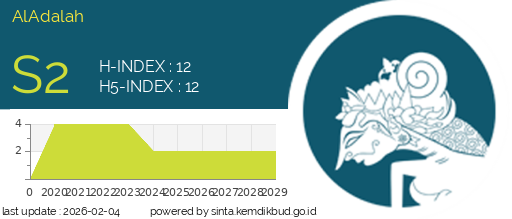ISLAM AND NEO-MODERNISM IN INDONESIA: REVISITING NURCHOLISH MADJID AND ABDURRAHMAN WAHID’S THOUGHT ON CIVIL SOCIETY
DOI:
https://doi.org/10.35719/aladalah.v26i2.371Nurcholish Madjid and Abdurrahman Wahid are regarded as two of Indonesia's most influential Muslim intellectuals at the turn of the twentieth century. Adapting the concept of Barton (1997), both Madjid and Wahid are not only prominent public intellectuals but also can be considered intellectual ulama, scholars who combine the best of classical scholarship and intellectual leadership with modern secular and Islamic learning and participated alongside other public intellectuals in Indonesia's civil society forums. In addition, Greg Barton labels these personalities and characteristics of thought as Neo-Modernists or Neo-Modernist thinkers. This paper examines the interpretation of Madjid, who studied in a more Western academic culture, and Wahid, who studied in a Middle-Eastern country, on civil society as the manifestation of both Neo-Modernism's thought, followed by a discussion on the similarities and differences between the two ideas. Through an exploratory and comparative analysis, this study reveals that the Neo-Modernism interpretation of civil society articulated by both can be seen in their progressive thought towards Islam and society, Madjid with his idea of 'secularization' and further changed into 'de-sacralization'; while Wahid with his thinking on the indigenization of Islam (pribumisasi Islam). Their thoughts introduce an open, inclusive, progressive understanding of the relationship between Islam and civil society, asserting social pluralism and modernity and stressing the need for tolerance and understanding. Moreover, this paper also argues that both interpretations of Islam and civil society have been constructive for Indonesia in promoting democratic reforms, strengthening the importance of the Pancasila (the five pillars) foundation and state constitution, not religious sectarianism (theocracy), thus refuting the notion that Islam is incompatible with democracy and pluralism and assisting Indonesian society in the productive synthesis of Islamic ideas and modern concepts such as democracy, liberalism, and secularism.
Downloads
References
Abdullah, M. Amin. “Nurcholish Madjid and Religious Pluralism in Indonesian Islam.” In Pluralism in Islamic Contexts - Ethics, Politics and Modern Challenges, edited by Mohammed Hashas, 189–199. Cham, Switzerland: Springer Verlag, 2021. DOI: 10.1007/978-3-030-66089-5_11.
Abdurrahman, Moeslim. Islam Transformatif. Jakarta: Pustaka Firdaus, 1997.
Agung, Iskandar, and Rumtini. “Civil Society Pendidikan Karakter Bangsa.” Jurnal Pendidikan dan Kebudayaan 16, no. 9 (2010): 267–279. DOI: 10.24832/jpnk.v16i9.518.
Bakti, Andi Faisal. “Islam and Modernity: Nurcholish Madjid’s Interpretation of Civil Society, Pluralism, Secularization, and Democracy.” Asian Journal of Social Science 33, no. 3 (2005): 486–505. DOI: 10.1163/156853105775013634.
Barton, Greg. “Neo-Modernism: A Vital Synthesis of Traditionalist and Modernist Islamic Thought in Indonesia.” Studi Islamika 2, no. 3 (1995): 1–75. DOI: 10.15408/sdi.v2i3.827.
_____. “Indonesia’s Nurcholish Madjid and Abdurrahman Wahid as Intellectual “Ulama”: The Meeting of Islamic Traditionalism and Modernism in neo-Modernist Thought.” Islam and Christian–Muslim Relations 8, no. 3 (1997): 323-350. DOI: 10.1080/09596419708721130.
_____. Biografi Gus Dur: The Authorized Biography of KH. Abdurrahman Wahid. Yogyakarta: LKiS Pelangi Aksara, 2003.
Barton, Greg, Ihsan Yilmaz, and Nicholas Morieson. “Authoritarianism, Democracy, Islamic Movements and Contestations of Islamic Religious Ideas in Indonesia.” Religions 12, no. 8 (2021): 1-20. DOI: 10.3390/rel12080641.
Bruinessen, Martin van. “Nurcholish Madjid: Indonesian Muslim Intellectuals.” ISIM Review 17, issue 1 (2006): 22–23. https://hdl.handle.net/1887/17055.
Cohen, Jean L. and Andrew Arato. Civil Society and Political Theory. Cambridge, MA: MIT Press, 1992.
Culla, Adi Suryadi. Masyarakat Madani: Pemikiran, Teori, dan Relevansinya dengan Cita-Cita Reformasi. Jakarta: Rajawali Pers, 1999.
Edwards, Michael. Civil Society. Cambridge, UK and Malden, MA: Polity Press, 2004.
Esposito, John L. “Abdurrahman Wahid: Scholar-President.” In Makers of Contemporary Islam, edited by John L. Esposito and John O. Voll, 199–218. New York: Oxford University Press, 2001.
Fuad, Muhammad. “Civil Society in Indonesia: The Potential and Limits of Muhammadiyah.” Sojourn: Journal of Social Issues in Southeast Asia 17, no. 2 (2002): 133-163. http://www.jstor.org/stable/41057084.
Hefner, Robert W. “Islam, State, and Civil Society: ICMI and the Struggle for the Indonesian Middle Class.” Indonesia 56 (October 1993): 1-36. https://hdl.handle.net/1813/54013.
Madjid, N. Islam, Doktrin dan Peradaban: Sebuah Telaah Kritis tentang Masalah Keimanan, Kemanusiaan, dan Kemodernan [Islam, Doctrine, and Civilization: A Critical Study on the Problem of Faith, Humanity and Modernity]. Jakarta: Yayasan Paramadina, 1992.
_____. Indonesia Kita [Our Indonesia]. Jakarta: Yayasan Paramadina, 2004.
Menchik, Jeremy. “Productive Intolerance: Godly Nationalism in Indonesia.” Comparative Studies in Society and History 56, no. 3 (2014): 591-621. DOI: 10.1017/S0010417514000267.
Mukarom, A. Soheh. “Pribumisasi dalam Pandangan Abdurrahman Wahid.” Religious: Jurnal Studi Agama-Agama dan Lintas Budaya 2, no. 1 (2017): 63–74. DOI: 10.15575/rjsalb.v2i1.2217.
Rais, Syamsul Kurniawan M. “Neo Modernisme Islam Nurchalish Madjid: Relevansinya dengan Pembaruan Pendidikan Islam.” Khatulistiwa: Journal of Islamic Studies 1, no. 2 (2011): 135-150. DOI: 10.24260/khatulistiwa.v1i2.187.
Rozak, Abdul, Dasim Budimansyah, Endang Sumantri, and Udin S. Winataputra. “Political Thoughts and Socio-Cultural Nationalism Ideologies of Nurcholish Madjid on Strengthening Democracy, Civil Societies and Civic Virtues in Indonesia.” Asian Social Science 11, no. 27 (2015): 142–154. DOI: 10.5539/ass.v11n27p142.
Saeed, Abdullah. “Ijtihad and Innovation in Neo–Modernist Islamic Thought in Indonesia.” International Journal of Phytoremediation 21, no. 1 (1997): 279–295. DOI: 10.1080/09596419708721127.
Tajuddin, Muhammad Saleh, Muhamad Amar Mahmad, and Solahuddin Abd. Hamid. “Ibn Khaldun’s Concept of Civil Society and its Relation to the Discourse of Indonesian Civil Society.” JICSA 3, no. 2 (2014): 1–11. DOI: 10.24252/JICSA.V3I2.781.
Tsauro, M. Ahalla. “Intellectual Legacies for the Youth: Nurcholis Madjid’s Ideas on History and Development in Indonesia.” In Heritage, Culture and Society:Critical Voices of Young Malays, edited by Azhar Ibrahim Alwee and Norshahril Saat, 201–215. Singapore: The Malay Heritage Foundation, 2021.
Downloads
Section
License
Copyright (c) 2023 Dito Alif Pratama

This work is licensed under a Creative Commons Attribution-NonCommercial 4.0 International License.
This work is licensed under a Attribution-NonCommercial 4.0 International (CC BY-NC 4.0).

























 Al'Adalah licensed under Creative Commons Attribution-NonCommercial 4.0 International License.
Al'Adalah licensed under Creative Commons Attribution-NonCommercial 4.0 International License.